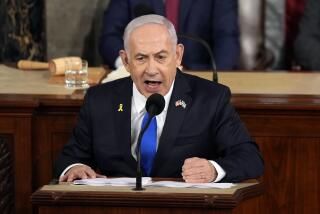U.S. Reaffirms Plan to Sell 9 F-16 Jets to Indonesia
- Share via
WASHINGTON — The Clinton administration reaffirmed Thursday that it plans to go ahead with the sale of nine F-16 jet fighters to Indonesia, despite the country’s human rights violations and recent allegations that wealthy Indonesians have sought to buy political influence with the White House.
Senior administration officials said that the sale, the outlines of which were agreed to earlier this year, is likely to be completed early in 1997, after the new Congress convenes. The price was not disclosed.
The decision comes over the objections of human rights advocates--and some U.S. lawmakers--who said that the White House should cancel the sale to protest Indonesia’s continued subjugation of East Timor, where Indonesian troops reportedly have committed massacres.
House Speaker Newt Gingrich (R-Ga.) said Thursday that the deal should be suspended pending an investigation of donations by members of a rich Indonesian banking family to Democratic campaign coffers. Gingrich said Congress would conduct hearings on the contributions next spring.
Indonesia’s human rights violations have been thrust into the spotlight again in recent days following the decision by the Nobel Prize Committee to award the 1996 Nobel Peace Prize to Carlos Filipe Ximenes Belo, East Timor’s Catholic bishop, and a journalist there.
East Timor, a small island, was invaded and annexed to Indonesia in the mid-1970s, and Indonesian troops have massacred inhabitants in an effort to secure full control. President Clinton has called the situation “unconscionable.”
Despite the protests, however, senior administration officials have insisted that Washington still believes the sale of the jet fighters would be in U.S. interests because it would help bolster stability in East Asia.
The administration also is counting on the deal to help end a long-standing U.S. dispute with Pakistan, which bought the same nine aircraft and 19 others in 1989 but was barred by U.S. law from taking delivery after the Pakistani government was found to be building nuclear weapons. The United States was paid for the planes by Pakistan but never delivered them.
Officials said that Pakistan, which under U.S. law would have been unable to get the money back if the planes had not been sold to another country, probably will use the proceeds from the Indonesian sale to buy reconditioned Mirage fighters from France.
State Department spokesman Phyllis Young said that the sale to Indonesia would not conflict with U.S. policies on human rights because it is unlikely that Indonesia would be able to use the aircraft to “suppress legitimate dissent,” as it might with small arms.
The United States has objected formally to a variety of human rights violations by the Indonesian government over the past few years, from using the military to settle labor disputes to the torturing and beating of civilians to discourage separatist activities.
Rep. Benjamin A. Gilman (R-N.Y.), chairman of the House International Relations Committee, told State Department officials recently that if the Indonesian deal was proposed officially he would introduce legislation to block it.
The controversy widened in the last week after disclosures that several wealthy Indonesian businessmen had given large contributions to the Democratic Party. Republicans and other critics have questioned whether the money had influenced administration policies toward Indonesia.
The dispute with Pakistan over the original sale of the F-16s had become a major bone of contention between Washington and Islamabad, which had been a U.S. ally during much of the Cold War.
In 1995, during a visit by Pakistani Prime Minister Benazir Bhutto, Clinton conceded that it was “not fair” for Washington to keep the money that Pakistan had paid for the F-16s if it did not intend to deliver them and vowed to find a solution to the problem.
The difficulty stemmed from a 1985 law, sponsored by Sen. Larry Pressler (R-S.D.) that prohibits the United States from providing military aid or selling equipment to Pakistan unless the president can certify that it is not involved in developing nuclear weapons.
More to Read
Sign up for Essential California
The most important California stories and recommendations in your inbox every morning.
You may occasionally receive promotional content from the Los Angeles Times.













